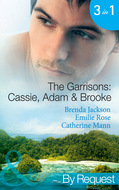Kitap dosya olarak indirilemez ancak uygulamamız üzerinden veya online olarak web sitemizden okunabilir.
Kitabı oku: «The Wilders», sayfa 2
It was obviously the last thing she had ever expected to hear from him. Anna looked at Peter, utterly surprised. “You need my help?”
He could feel Ella looking at him, mystified. But it was true. He did need Anna’s help. “Yes.”
This was definitely a first, Anna thought. An uneasiness immediately slipped over her. An uneasiness because she had a feeling she knew what her older brother was going to say. And if she was right, she was going to have to turn him down. Because she was facing a huge conflict of interest. So, she made a preemptive strike, nipping a potential problem in the bud before she was faced with it. “I’m sorry, Peter, but all my time is already accounted for over the next few months,” she said firmly.
“I see.” He let the matter drop, silently upbraiding himself. Given their distance recently, he should have known better than to ask.
Peter’s small, two-story house was stuffed with people. Nearly everyone who’d attended the service and gone to the cemetery had followed the stretch limousine back to the reception.
Peter mentally tipped his hat to Ella. He had no knowledge of these kind of situations, no idea what was expected beyond the necessary funeral arrangements. Ella had handled all the subsequent preparations, securing a caterer and telling the man what to bring, where to set up and when.
Initially, when he’d seen how much food was going to be on hand, Peter had envisioned himself having to live on leftovers for the next six months. Watching his various guests help themselves, he smiled now, thinking that if there was enough left over for a sandwich for lunch tomorrow, he’d be doing well.
He supposed that sorrow brought out the hunger in some people. As for him, the exact opposite was true. He wasn’t sure if he’d had more than a single meal since his father had suffered the fatal heart attack that had taken the man away from them.
Damn, but I am going to miss you, Dad. You left too soon, he thought not for the first time.
“You’re not eating.”
The words took him by surprise. Or rather, the voice did. Bethany Holloway, the Jill-come-lately to the hospital’s board of directors.
As he turned to look at her, he caught himself, thinking that David was dead-on in his evaluation of her appearance. But he had a sneaking suspicion that they might find themselves on the opposite sides of an opinion.
Pity, he thought.
“That’s because I’m not hungry,” he said, punctuating his statement with a half-hearted smile.
“You really should have something,” Bethany advised. The next moment, she was putting into his hands a plate containing several slices of roast beef and ham that she had obviously taken for herself. “You’re looking a little pale.”
Trying to return the plate to her proved futile. “You have a degree?” he asked amiably.
Bethany knew he meant in medicine, but she deadpanned her answer.
“In observation.” She quickly followed up with, “And it doesn’t take much to see that you haven’t been visiting your refrigerator with any amount of regularity.” That actually stirred a few distant memories within her. She really had so few when it came to her own home life. “My father used to get too caught up in his work to remember to eat,” she added, hoping that might persuade him to take a few bites. She could well imagine how he had to feel. It wasn’t easy losing family, and from what she’d observed of father and son, they had been close.
“Used to?” Peter echoed. “Is he—” He couldn’t bring himself to finish the question. The word dead stuck in his throat like an open wound, the kind sustained by swallowing something that was too hot.
“Gone?” she supplied. It was a nice, safe word for what he was implying, she thought. “No, actually, I’m the one who’s gone. From the state,” she added quickly when she saw his eyebrows draw together in minor confusion. “As far as I know, both of my parents are still working like crazy.” Bethany lifted one shoulder in a quick, careless shrug and then took a sip from the glass of diet soda she was holding in her other hand. “It makes them happy so I suppose it’s all right.”
From her tone, Peter inferred that it was not all right with her. Questions about her began to form in his mind.
Bethany looked around the tightly packed family room and beyond. There was barely enough space for people to mill around without rubbing elbows and other body parts against one another.
“This a very large turnout.” She smiled at him. “Your father had a lot of friends.”
To know his father was to like him, Peter thought. “That he did.”
“I didn’t know him very well,” Bethany began, picking her words carefully, “but the little I did know, I liked a great deal.” Her smile widened and Peter caught himself thinking that she had an extremely infectious smile. “He reminded me a little of Jimmy Stewart in It’s A Wonderful Life, always thinking about other people and what they needed.” She raised her eyes to his and, just for an inkling, Peter thought he felt something inside himself stirring, reacting to the soft blue gaze. “You kind of look like him.” He perceived a hint of pink along her cheeks. “I mean, like the portrait of him that’s hanging in the hospital corridor outside the administration office. Same strong chin, same kind eyes.”
And then she laughed. “I’m sorry,” she apologized. “I always speak my mind. My mother told me it would get me in trouble someday.” Lectured her, actually, but Peter didn’t need to know that.
“And has it?” he asked. “Gotten you in trouble I mean.”
She shook her head. “Not yet, but there’s still time.” Bethany looked past his shoulder. A curious expression slipped over her flawless features. “I think that man is trying to get your attention.”
Peter turned to look over his shoulder and saw Fred Trinity, his father’s lawyer. The latter looked relieved to make eye contact and waved him over.
What’s this all about? Peter wondered. The formal reading of the will, not that it was really necessary, was set for tomorrow.
Well, he might as well find out, he thought. “If you’ll excuse me,” Peter murmured, handing her back the plate she’d given him.
“Of course.” Bethany frowned at the untouched fare on the plate. “Don’t forget to eat something,” she called after him. And then, with a resigned sigh, she turned back to the crowd.
It took him a minute before he realized that he was just standing there, watching her walk away, thinking that the woman looked good going as well as coming.
Chapter Three
With his shaggy mustache and gleaming bald head, Fred Trinity looked like a walrus in an outdated suit that might have fit him well some twenty-five, thirty pounds ago. His carelessness, however, only extended to his appearance. His mind was as sharp as the point of a sword.
Placing a solicitous hand on Peter’s arm, the lawyer lowered his voice, as if the weight of his words wouldn’t allow him to speak any louder.
“Could I see you alone for a minute, Peter?”
The grave expression on the man’s round, ordinarily amiable face was not reassuring. A chill passed over Peter’s shoulder blades and he couldn’t help wondering if this had anything to do with the threat he’d so recently been made aware of, the one posed by NHC. Fred had been his father’s lawyer for as long as he could remember, but he wasn’t the legal counsel that the hospital board turned to. Still, Fred might have been privy to some sort of inside information. Lawyers talked among themselves like everyone else, didn’t they?
Bracing himself, Peter nodded. “Sure.” He indicated the doorway leading to other parts of the house. “We can go to my study. It’s just down the hall.”
Crossing the living-room threshold, Peter led the way out.
“I’ve never been to your house before,” Fred commented, looking around.
“It’s not much of a treat,” Peter confessed. “I’m afraid I’ve let things get away from me. You know how it is.”
“Actually, no,” Fred replied. “Selma handles all that. You need a wife, Peter.”
“I’ll put it on my list of things to do,” Peter promised.
The house was older than Peter and in need of attention and a fair amount of updating. Other than hiring an occasional cleaning crew to do battle with the cobwebs and the dust, nothing had been changed since he’d moved in shortly after graduating from medical school. He honestly couldn’t remember the last time he’d had the house painted, but then, he rarely spent much time here.
He was always at the hospital, either in the O.R., the emergency room or in his fourth-floor office. His house was just the place where he received his mail, did his laundry and slept. Beyond that, it really didn’t serve much of a function.
Like the rest of the doors in the house, the door to his study was wide-open. He didn’t like closed doors. Closed doors meant secrets. It was a holdover from his childhood. On the rare occasions when his parents would have words, the doors were always closed. When they were opened again, his parents would emerge, each with sadness in their eyes.
As he walked in, Peter flipped a switch on his desk lamp, which cast a dim light.
He switched the three-way bulb on high, then turned around to face the man he had ushered in.
“What’s wrong, Fred?”
Fred looked somewhat uneasy. Peter couldn’t remember ever seeing the lawyer look anything but comfortably confident. Fred reached inside the breast pocket of his jacket and took out a bulky-looking white envelope. Watching Peter’s face, Fred held it out to him.
Across the front of the envelope, in his father’s very distinct handwriting, was his name.
“Your father wanted me to give this to you. It was only to be opened in the event of his death,” Fred explained and then sighed with genuine sorrow. It was no secret that he’d known James Wilder for over sixty years. They’d gone to school together. “Which is now. I am going to really miss that man. Did I ever tell you that he saved my life?”
Peter stared at the envelope before taking it. What could his father have written that he couldn’t have said to him in person?
“Twice.” A heaviness hovered over Peter as he took the envelope Fred was holding out. He had an uneasy feeling he didn’t want to know what was inside. “When did he give this to you?”
“Five years ago. Shortly after your mother died.” The man’s small mouth curved beneath the shaggy mustache. “I think her death brought mortality into his life in big, bright letters. It hit him then that no one was going to go on forever, not even him, and he had some things he wanted to get off his chest, I suppose.” Fred pressed his lips together. “Damn, I thought if anyone would have been able to cheat death, it would have been him.”
“Yeah, me, too.” His father was the most decent, honorable man he had ever known, as well as the most dedicated. There were no skeletons in his closet, no real deep, dark secrets. His father’s life had been an open book. “What makes you think my father had something he wanted to get off his chest?”
“Because, for one thing, there are no letters for David or Ella or Anna. I guess as the family’s new patriarch, he was turning to you.” Fred’s bushy eyebrows rose in surprise as he watched Peter tuck the letter into his own breast pocket without opening it. “Aren’t you going to read it?”
Peter shook his head. “Not right now. I need to get through this ordeal first before I’m up to tackling another problem.”
Fred nodded, but it was obvious he was curious about the envelope’s contents. However, it wasn’t his place to prod.
“Makes sense,” Fred allowed. His mission accomplished, he took a step toward the doorway, then stopped. “By the way, is tomorrow evening still convenient for the reading of the will?”
Convenient. What a strange word to use under the circumstances. Peter took a breath, doing his best to block the barrage of sadness that threatened to overwhelm him again.
“Tomorrow evening will be fine, Fred,” he replied quietly.
Fred continued to pause as another thought occurred to him. “What about Anna and David? I don’t see either one of them at the reception.”
“That’s because they’re not here,” Peter replied simply. He could see the answer didn’t please the man. Crossing back to the doorway, he turned off the light. “If there’s anything out of the ordinary in the will—” which he was confident there wouldn’t be “—I can always call and tell them.”
Fred nodded as they walked out of the room together. “Rumor has it that NHC is about to come knocking on the hospital’s door.” He stopped short of the living room. “What are you planning to do about it?”
“Not answer,” Peter replied with a finality that left no room for argument.
Fred grinned broadly and clapped him on the shoulder. He had to reach a little in order to do it. “Good man. You’d make your father proud.” He lowered his voice again, assuming a conspiratorial tone. “He’s watching over you now, you know that, don’t you?”
Peter merely offered a perfunctory smile. He wasn’t exactly sure how he stood on things like that. What he did know was he would have preferred to have his father at his side. Or better yet, leading this charge against the anticipated assault. James Wilder was far better suited to staving off the barbarians at the gate than he was.
But he was going to have to learn. And fast.
The first person Peter noticed when he walked into the boardroom the next morning was Bethany Holloway. Out of respect for the late chief of staff, she was wearing a black sheath. It made her hair seem more vividly red, her complexion ever more porcelainlike.
Black became her, Peter thought absently. On her, the color didn’t look quite as somber.
The eight other board members in the room were also wearing black or navy, undoubtedly prompted by the same desire to show respect, Peter mused. His father would have been surprised at how many people mourned his passing. But then, the man had always been so unassuming, never thinking of himself, only others.
His thoughts momentarily brought him back to the envelope Fred had given him last night. He’d left it, unopened, on the mantel in the living room, unable to deal with its contents. He knew that was making assumptions, giving it an importance it might not actually have, but he couldn’t shake the uneasy feeling that whatever was inside the envelope was going to change life for him as he knew it.
So for the time being, it was going to remain unopened. At the moment, he had enough windmills to tilt at. Especially if this threat posed by NHC actually was genuine.
The January sun had decided to make an appearance, pushing its way into the rectangular room via the large bay window that looked down onto the hospital’s emergency room entrance.
Despite the brightness, Peter felt a chill zip down along his spine as he walked into the room. Everyone was already there. He was on time; they were early. Was there some sort of a significance to that?
Wallace Ford, the newly appointed chairman of the board, walked up to him and shook his hand as if he hadn’t been at the service and subsequent reception just yesterday.
“Good of you to attend, Peter,” he said heartily. Dropping his hand, he sighed heavily. “Again, let me express my deepest sorrow regarding your father.” He cast a glance about the room before looking at Peter again. “We all lost someone very special to us.”
“Thank you, Wallace, I appreciate that.” Peter looked around at the other board members, all sitting at the long rectangular table. It seated twelve. Only nine seats were filled. He’d never paid attention to the exact number of board members before. There’d been no need. Maybe he should have.
Hindsight wasn’t helpful.
“Where do you want me?” he asked Wallace.
Wallace gestured toward the chair beside Bethany. “Why don’t you take the empty seat next to Ms. Holloway?” And then the chairman smiled at Bethany as if they were both in on a secret joke. “I guess you’re going to have to relinquish your title as the newest member of the board, Ms. Holloway.”
“Gladly,” Bethany replied.
Wallace waited until Peter took his seat and then, running his fingers along the gavel he refrained from striking, the newly appointed chairman called the meeting to order and addressed the group.
“Because this is an impromptu meeting and we all have other places we need to be, I’m going to dispense with the reading of the minutes today and get right down to the heart of the matter.” His small, brown eyes rested on Peter for a long moment. “Or matters, as the case might be,” he corrected himself.
“First of all, we, the board and I—” Wallace gestured grandly around the table before continuing, and it struck Peter that the man was a born showman who was given to dramatic pauses “—would like to offer the position of chief of staff to you, Dr. Wilder.”
For a moment, Peter didn’t know what to say. Chief of Staff had been his father’s position. In his later years, James Wilder juggled that and being chairman of the board. Both were full-time jobs. It never ceased to amaze him how his father managed to do justice to both, but he had. In the end, it had probably taken a toll on his health.
That notwithstanding, Peter was flattered by the offer, but he knew his limitations. With a self-deprecating smile, he shook his head. “Thank you, all of you, but I don’t believe I’m experienced enough to take that on.”
Wallace laughed at the refusal. “Modest. You’re your father’s son all right. Actually, we’re asking you to take the position on temporarily, just until we find a suitable candidate. Your father left very big shoes to fill. It’s going to take us a while before we find someone who comes close to his caliber. Until then, we would consider it an honor, as well as a huge favor, to have a Wilder in that position for a little while longer.” Wallace paused just long enough to allow the words sink in. “You’d really be bailing us out.”
Very adroitly, the new chairman of the board had maneuvered him until his back was against the wall. Peter knew he had no choice but to agree. It helped somewhat knowing that it was only for a little while.
“Well, put that way, I don’t think I can turn it down.”
“Wonderful. Then it’s settled. Peter Wilder is the new temporary chief of staff.” Wallace grew somber, as if the next topic could only be spoken about with the utmost respect and gravity. “As for the second reason for this meeting, I think we’re all aware of what that is, but I’ll be the one to say it out loud. Northeastern Healthcare has expressed a great interest in acquiring our little hospital and I believe that their offer is worth discussing at length.”
Peter could feel his stomach tightening. “As long as our final answer is no,” he commented.
Wallace shot him a look as if he’d just violated some sort of sacred procedure.
He probably had, Peter thought. He wasn’t up on the intricacies of parliamentary procedure and the kind of pomp and ceremony that went with conducting meetings properly. It had never aroused the slightest bit of interest in him.
What did interest him were people—patients—who needed his care, his skills. He couldn’t help wondering how his father, a very simple man at bottom, had been able to put up with all of this.
Wallace narrowed his eyes as he continued to look at him. “Excuse me?”
Now that he was in the potential fray, he might as well speak his mind, Peter thought. “Well, you can’t seriously be thinking about accepting their offer, Wallace.”
Wallace frowned. “You haven’t even heard the amount yet.”
Peter laughed shortly. “I don’t need to hear the amount. You can’t put a price on what we do here.”
“I’m sure that would come as a surprise to the insurance companies, Dr. Wilder,” Bethany said. She saw the incredulous look on the doctor’s face and quickly continued. She needed to make this man understand why he was wrong. “Patients pay for their care, that’s the whole point. And if that care can come about more efficiently, more quickly, it’s a win-win situation for us and for them.” Her voice grew more impassioned as she continued. “Besides, we’re just a simple hospital. One huge lawsuit could ruin us and force us to close our doors.”
“There’s never been a lawsuit against the hospital,” Peter said, in case she was ignorant of the fact.
“That doesn’t mean that there couldn’t be,” Bethany pointed out. “People are a great deal more litigation-crazy than they were when your father joined the staff here. With a conglomerate like NHC taking Walnut River General under its protective wing, we’re all but invulnerable.”
The other board members in the room faded into the background. One attempted to say something, but Peter ignored him. Because Walnut River General meant so much to his father, to him, this had suddenly become personal.
“And where does the patient fit in with all this?” Peter wanted to know. How could someone who looked like an angel be so cold?
“The patient is the one who benefits,” Bethany insisted. She clearly thought he was oblivious to that. “NHC puts us on the map, makes us eligible to receive grants, updates our equipment, perhaps even gets us state-of-the-art equipment. You can’t possibly ignore that.”
“No,” Peter agreed. “Updated equipment is extremely important, but that’s what we have fund-raisers for. And so far, they’ve done pretty well by us.”
The man just wasn’t getting the big picture. He thought too small. “Personal donations,” she said. “Think how much more we could do with allotments from a conglomerate with bottomless pockets.”
He wondered if she was actually that naive, or if it was a matter of her being heartless. He preferred thinking it was the former, but he had a feeling he was wrong. “Isn’t that a little like selling our souls for thirty pieces of silver?”
Wallace cleared his throat, getting them to both look in his direction for a moment and breaking the growing tension.
“Aren’t you being a little dramatic, Peter?” Wallace asked.
“No, I’m being pragmatic,” he responded. “I didn’t go to medical school to practice assembly-line medicine.” His main focus wasn’t Wallace, it was Bethany. He wanted to make her understand, to see the flaw in the way she thought. “The doctors here treat the whole patient, they don’t deal with him or her piecemeal. I don’t want some accounting analyst holding a stopwatch and looking over my shoulder, telling me that I need to move faster or I’ll wind up pulling the hospital’s batting average down.”
“There’s nothing wrong with seeing more patients,” Bethany insisted.
“There is if you wind up shortchanging them because you have a quota to meet or a schedule to live up to. Can’t you see that?”
Bethany’s eyes flashed angrily. Was he accusing her of being obtuse? She’d never reacted well to criticism. She’d had to put up with a lot of it while she’d been growing up. She didn’t have to anymore.
“You’re ignoring all the benefits that being part of an organization like Northeastern Healthcare can provide for the hospital. They have access to far more facilities than we do.”
“Looks like someone has done their homework,” Wallace said. There was no missing the admiration in his voice or the approving look on the chairman’s face as he looked at Bethany.
Was Wallace for the takeover, or was he just trying to score points with Bethany? Peter wondered in mounting frustration.
He didn’t often lose his patience, but his father’s death had changed the rules and shaken him down to his very foundation.
“Then give her a gold star, Wallace, but don’t give NHC the hospital. Everyone will regret it if you do, most of all, the patients.” Peter rose from his chair. The legs scraped along the floor as he pushed it back from the table. “Now, if you will all please excuse me, I have patients waiting to see me.”
It was only by calling up the greatest restraint that he didn’t slam the door behind him as he left.









